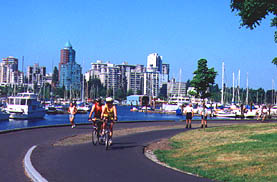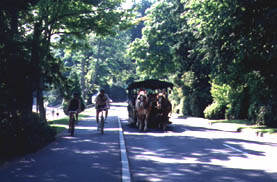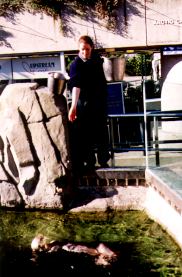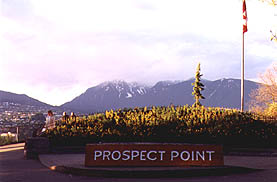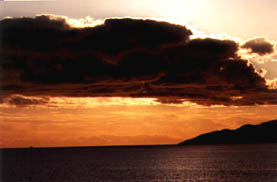|
Jan
Lee's Travellin' News
|
|
|
Vancouver's
cityscape from Stanley Park.
|
|
Photo
Courtesy of Jan Lee
|
My earliest memories of Vancouver
begin with a trip to Stanley
Park. I was 13, old enough to travel by bus, young enough to consider
a trip to a 405 hectare/1000 acre park an adventure. I was also just
old enough to baby sit my little brothers, who, like most kids in Vancouver,
considered the park's two swimming pools their summer home-away-from-home.
When we weren't cooling ourselves in the ocean-fed salt water pools,
or visiting the aquarium, we were riding one of the park's miniature
trains, or gorging ourselves on Stanley Parks's hot dogs and cotton
candy. It was a magical time in Vancouver, and a magical way to grow
up.
Since that time, the old salt water reservoirs have been replaced with
state-of-the-art chlorinated swimming pools. The park now has a wealth
of dining establishments, and there are several new shuttle and tour
services that frequent the park. Not surprisingly, my cravings for cotton
candy have disappeared, but I still find myself drawn to the park's
shores and amazing vistas.
|
|
|
A perfect
day in the park.
|
|
Photo
Courtesy of Jan Lee
|
Stanley Park was established in 1888 as Vancouver's first natural reserve
and is touted to be the third largest of its kind in North America.
With an average of 8 million visitors per year, it is also Vancouver's
most popular attraction. Situated at the northwestern tip of Vancouver,
the park is less than 5 minutes drive from downtown. Georgia Street
(west) will take you directly into the park. Stay in the right hand
lane (the left lanes take you to the Lions Gate Bridge and West Vancouver).
If you prefer to walk to the park, it is approximately 1.5 km/1 mile
from downtown.
Pay-parking is in effect in the park during the day. During the summer,
the Parks Board provides a free shuttle service for visitors. Look for
the brightly-painted Stanley Park trolley as it makes its circle tour
along the sea wall. You can board the trolley at any number of stops
throughout the park. You also book tours through the same trolley company
(Vancouver Trolley Company) at other times of the year.
|
|
|
Feeding time
for otters at the Vancouver Aquarium.
|
|
Photo
Courtesy of Jan Lee
|
There are also a number of other companies that provide tours throughout
the city. LandSea Tours offers excursions to Stanley Park as well as
the North Shore and Whistler. Stanley Park's Horse Drawn Carriages provide
romantic sojourns through some of the park's favourite haunts.
Coal Harbour is the starting point the park's driving tour. The famous
Stanley Park totem poles sit on a grassy knoll between Coal Harbour
and Brocton Point. Both the trolley buses and the horse drawn carriages
begin their tours from the Coal Harbour parking lot.
Leaving Coal Harbour, the one-way Park Drive takes you along the park's
famed seawall, through canopied forests and past expansive vistas. The
stone seawall, which extends more than 8 km/5 miles around the perimeter
of the park, is itself a testament to history. It took workers 60 years
to construct the massive barrier, which was initially created to stop
erosion of the park's shoreline. Walking and biking paths skirt the
edge of the seawall and provide a relaxing way to take in some of Vancouver's
best sights.
The Vancouver Aquarium is located just off of Coal Harbour and is one
of the park's most popular attractions. The Aquarium features several
educational programs and manages a marine mammal rescue and rehab program
for injured or abandoned marine life. Unfortunately, some of the Aquarium's
littlest residents include "cute" baby seals which were found left alone
by the seawall and were carried in by concerned individuals. Visitors
are asked to call the Aquarium before touching the animal (the mother
will not return to the pup if a human has touched it).
|
|
|
Prospect Point
|
|
Photo
Courtesy of Jan Lee
|
Approximately 2 km further, you will come to Brocton Point, site of
the Stanley Park totem poles and a great view of the Burrard Inlet.
Prospect Point, the park's tallest point, sits under the shadow of
the Lion's Gate Bridge, the gateway to the North Shore and points beyond.
A gift shop, full-service restaurant and a coffee shop overlook the
Point's breathtaking vista and provide a comfortable rest to visitors.
You will see signs leading you left to the Miniature Railway and Children's
Farmyard, where you can take a ride behind an the exact replica of an
1880's locomotive engine. The Children's Farmyard has a number of petting
animals that the little ones will enjoy.
If you follow the path past the farm to the bottom of the hill, you
will come to the Japanese Canadian War Memorial. Erected in 1920 to
acknowledge the contributions of Japanese Canadians who gave their life
for their country, the memorial sits in the midst of a carefully manicured
garden.
Just beyond the memorial is the back entrance to the Vancouver Aquarium,
which you passed earlier on your sojourn through the park.
|
|
|
Sunset at
Ferguson Point.
|
|
Photo
Courtesy of Jan Lee
|
Returning to your driving tour of Stanley Park, you will come to Ferguson
Point, at the mouth of the Burrard Inlet. Further evidence of Stanley
Park's unique history can be found in the Teahouse Restaurant, the original
site of a World War II officer's mess. Enjoy a light lunch or dinner
overlooking one of Stanley Park's prettiest seascapes.
Lost Lagoon (east of Second Beach), is the home of a bird sanctuary.
Many a patient hour was spent here with my little brother as he educated
me in the unusual life of northwest coast birds. The Lagoon's Nature
House provides an interesting view of the park's flora and fauna.
There are a number of other recreational activities to enjoy in the
park as well. For tennis buffs, there are 17 tennis courts near the
Beach Avenue entrance (the southwest area of the park). There is also
a pitch and putt golf course surrounded by a spectacular rhododendron
garden. In the summer, the Malkin Bowl hosts Theatre under the Stars,
a magical way to spend a perfect Vancouver summer evening.
© Copyright Jan Lee
Jan Lee jnlee@sfu.ca
Be sure to read other
articles by Jan Lee in the BC Adventure Network

|


